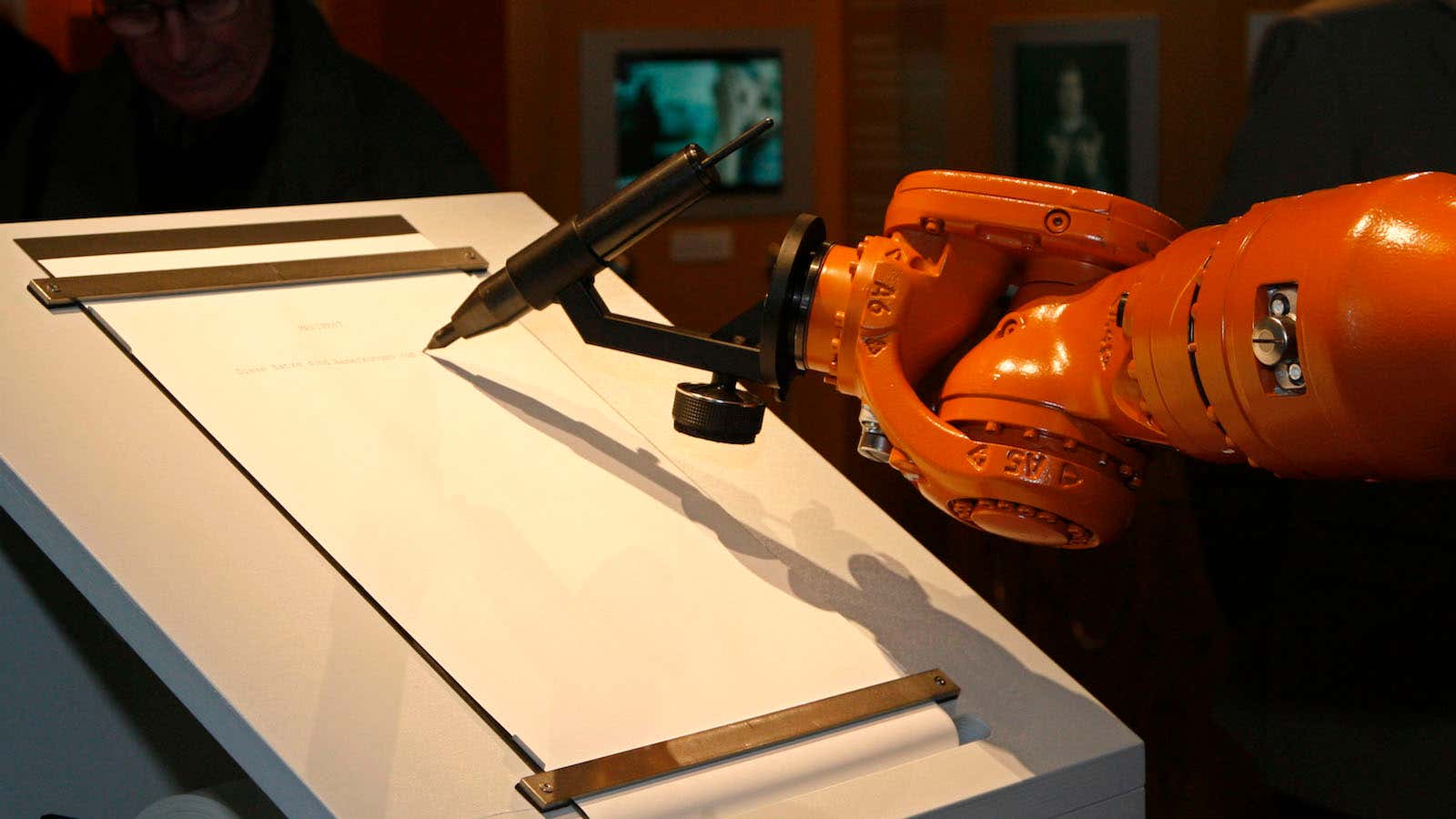There’s a scene in I, Robot, the 2004 Will Smith movie, in which Smith’s character, Detective Spooner, tries to get a robot to understand that it’s not human.
“Can a robot write a symphony? Can a robot turn a canvas into a beautiful masterpiece?” he asks.
“Can you?” it replies.
This exchange typifies our common-sense reasoning that art is the exclusive domain of humans. Robots and computers may think faster, calculate more accurately, and be able to access more information, but we assume they can’t be beacons of creation. This presumption is often reinforced by examples such as this one, in which an AI was tasked with creating and naming new colors. (It did not go well.)
So if you think about writing as a form of creative art, as I do, it’s difficult to think of it as something that computers could do, nonetheless do well. Surely an algorithm can’t judge the wit of a cleverly turned phrase or the heft of a heady argument any more than it can suggest new color combinations to assist a painter.
But writing is not entirely creative. There are rules—and there are already technologies that can help writers follow those rules. The Hemingway App, which we reviewed here, is an example of a system that does this well. But these technologies generally flag subject and verb disagreements or caution against using the passive voice, which are only modest steps up from Microsoft’s squiggly red misspelling underline.
But Revision Assistant, an AI system from Turnitin, the company that checks written work for plagiarism, says their creation can do more than rule-check writing: The creators claim they can use algorithms to help people become better writers. As someone who writes the occasional word or two—and as a human eager to safeguard our creative domain—I was skeptical.
“Like any art, writing is not necessarily intuitive,” Elijah Mayfield, the founder of Revision Assistant told me. “Learning to write is at least as hard as learning calculus or learning how to build a circuit. Different, but it’s a skill nonetheless and something you can learn.”
After penning attention-grabbing white papers on machine learning and data mining while working on his PhD at Carnegie Mellon, assessment companies called on Mayfield’s expertise to build programs that could grade essays. He wrote code that could identify key points in writing assignments and score standardized written answers accordingly. By 2013, while still in school, he decided that the systems he’d built for grading essays could be used just as well—perhaps even better—for the writing process itself, not just the grading. “Everyone agreed,” he said. “But no one was interested in funding it.” So he built it himself.
Revision Assistant is now being used by 200,000 students in more than 100 US school districts. Mayfield says what he is doing is similar to what other machine-learning systems are doing—we just don’t think of them that way. “Everyone is going crazy for self-driving cars,” he says. “It’s the same thing. The machine can recognize things in the data and decide what the right course of action is: brake, turn, slow down. But instead of driving, it’s an essay, and instead of taking the action or telling them what they need to do, we highlight it and motivate them to do the work, to take the next step.”
So, for example, if Revision Assistant spots a section that seems as though it should include supporting examples but doesn’t have any, it highlights the area and encourages the writer to expand. “We want to focus the writer’s attention on things but leave the creative work to them,” Mayfield says.
As such, it’s designed to amplify, not replace, good teaching. But still, the repetition and instant engagement help the writing process become deeper, better, and more creative. Over many revisions, the students are learning to spot these issues on their own and become better and more confident writers.
Not every kid using Mayfield’s fancy writing machine may be the next Faulkner or Wallace. “We’re not comparing these students to Shakespeare or trying to turn them into that,” he says. “But we are helping amateurs learn to be experts in their craft. At this level, writing is a precision craft, not art.”
Like most of us, AIs may still struggle to create actual art. But, as Revision Assistant is proving, they can be tools that help us become better skilled in creative fields. Personally, if an algorithm assistant or a robot can help me be a better writer, I’ll take all the help I can get.
